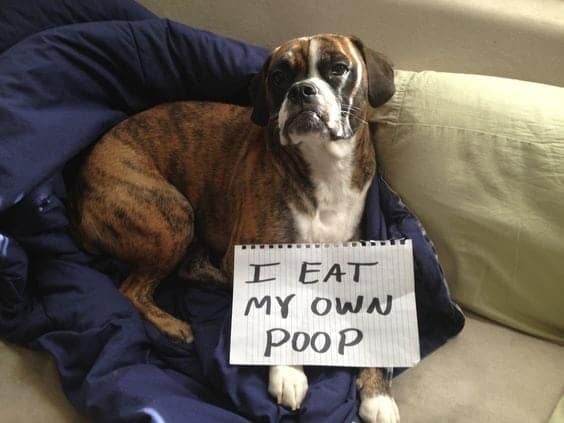Coprophagia, Dog Eating Poop, Why is My Dog Eating Poop?
Why is My Dog Eating Poop? Understanding Coprophagia in Dogs
Why is My Dog Eating Poop? Understanding Coprophagia.
Why is My Dog Eating Poop? Understanding Coprophagia in Dogs by Will Bangura, M.S., CBCC-KA, CPDT-KA, (Dog Behaviorist) Certified Behavior Consultant.
Coprophagia, the consumption of feces, is a behavior that many dog owners find both concerning and repulsive. This is a common behavior among dogs, and while it may seem gross to humans, it is often normal and natural for canines. However, Coprophagia can also be a symptom of underlying health or behavioral issues, harming a dog’s health and hygiene. This article will explore the causes of Coprophagia, its risks, and the various treatments available for this behavior.
What is Coprophagia?
Coprophagia or a dog eating poop, is a behavior where dogs eat their feces or that of other animals. While this may seem bizarre and disgusting to humans, it is pretty standard among canines. Dogs are scavengers by nature, and their ancestors in the wild often had to consume feces or other waste materials to survive. Furthermore, puppies may develop the behavior by observing their mother cleaning them by licking their anogenital area and inadvertently learning to consume feces.
Why do dogs develop Coprophagia?
Dogs can develop Coprophagia for several reasons, including medical conditions, nutritional deficiencies, and behavioral issues.
Medical Causes.
In some cases, Coprophagia can be a symptom of underlying medical issues such as pancreatic insufficiency, parasites, malabsorption syndrome, and thyroid issues. These conditions may lead to poor digestion and nutrient deficiencies, triggering the behavior.
Nutritional Deficiencies.
Dogs that lack certain essential nutrients in their diet may consume feces to fulfill their nutritional needs. For example, dogs with inadequate amounts of protein, fiber, or specific vitamins may be more prone to this behavior.
Why is My Dog Eating Poop? Understanding Behavior and Coprophagia.
Behavioral Issues.
Stress, boredom, anxiety, and other behavioral problems may also trigger Coprophagia in dogs. Dogs lacking sufficient physical and mental stimulation may eat feces to relieve boredom or anxiety.
What Causes Coprophagia?
While the exact causes of Coprophagia are not fully understood, several factors may contribute to this behavior.
Lack of Nutrients in Diet.
One of the most common causes of Coprophagia is a lack of essential nutrients in a dog’s diet. Dogs with low-quality diets lacking vital nutrients may be motivated to eat feces to obtain these missing nutrients. A balanced and nutritious diet that provides all necessary nutrients, including protein, fiber, and vitamins, can help prevent this behavior.
Hunger.
Dogs not receiving sufficient amounts of food may be more prone to Coprophagia. In this case, providing adequate amounts of high-quality food can help to prevent the behavior.
Imitation.
Puppies may learn to consume feces by imitating their mother, who may clean them by licking their anogenital area.
Anxiety and Stress.
Dogs may engage in Coprophagia when they feel stressed or anxious. Changes in routine, a new environment, or separation anxiety may also trigger this behavior.
Medical Conditions.
As previously mentioned, Coprophagia may be a symptom of underlying medical conditions such as pancreatic insufficiency, parasites, malabsorption syndrome, and thyroid issues.
Why is My Dog Eating Poop? Understanding Treatments Available For Coprophagia.
What Treatments are Available for Coprophagia?
Various treatments are available for Coprophagia, including medical, dietary, and behavioral treatments.
Medical Treatment.
Identifying and treating any underlying medical conditions that may be causing the behavior is an essential part of medical treatment. A veterinarian may prescribe medication or supplements for parasites, malabsorption syndrome, and thyroid issues.
Dietary Treatment.
Providing a nutritionally balanced and high-quality diet that meets a dog’s nutritional needs is crucial in preventing Coprophagia caused by nutritional deficiencies. This includes feeding a diet rich in protein, fiber, and essential vitamins and minerals. Providing small, frequent meals throughout the day can also help reduce the likelihood of a dog feeling hungry and consuming feces.
Behavioral Treatment.
Behavioral treatments can be helpful for Coprophagia caused by anxiety, stress, or boredom. Providing adequate physical and mental stimulation, such as regular exercise and interactive toys, can help to relieve stress and anxiety. Training techniques such as positive reinforcement and distraction can also redirect a dog’s attention away from consuming feces.
Preventative Measures.
Preventative measures can also be taken to reduce the likelihood of Coprophagia. This includes removing access to feces by promptly cleaning up after a dog and preventing access to litter boxes or other sources of feces. Dogs should also be supervised and given appropriate training and mental stimulation to prevent boredom and stress.
Coprophagia is a common behavior among dogs but can also be a symptom of underlying medical or behavioral issues. While it may seem gross and concerning to humans, it is often normal and natural for canines. Identifying and addressing the underlying cause is essential in preventing and treating Coprophagia. By providing a balanced and nutritious diet, adequate physical and mental stimulation, and promptly removing access to feces, dog owners can help prevent this behavior and ensure the health and well-being of their furry friends.
References.
- Hart, B. L. (2016). Behavioral manifestations of gastrointestinal disorders in pet dogs. Journal of the American Veterinary Medical Association, 248(5), 487-494.
- Houpt, K. A. (1998). Coprophagia and related problems. Veterinary Clinics of North America: Small Animal Practice, 28(2), 315-322.
- Sherman, B. L., & Gellatly, D. L. (1993). Coprophagy in dogs: a review. Journal of the American Animal Hospital Association, 29(6), 521-526.
- Stockman, J., & Fascetti, A. J. (2013). Nutritional adequacy of diets formulated for dogs with coprophagia. Journal of the American Veterinary Medical Association, 242(11), 1502-1508.
- Yamamoto, M., Ito, Y., & Nishikawa, Y. (2021). Coprophagia in dogs: a review of the current knowledge. Animals, 11(1), 109.


